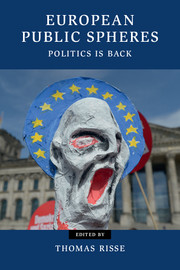Book contents
- Frontmatter
- Contents
- List of figures
- List of tables
- List of contributors
- Preface
- 1 Introduction
- Part I How to grasp the Europeanization of public spheres: theory, methods, empirics
- Part II Consequences: does the Europeanization of public spheres matter?
- Part III Theoretical and normative implications
- Bibliography
- Index
1 - Introduction
Published online by Cambridge University Press: 05 November 2014
- Frontmatter
- Contents
- List of figures
- List of tables
- List of contributors
- Preface
- 1 Introduction
- Part I How to grasp the Europeanization of public spheres: theory, methods, empirics
- Part II Consequences: does the Europeanization of public spheres matter?
- Part III Theoretical and normative implications
- Bibliography
- Index
Summary
The euro crisis has been arguably the most profound crisis in the history of European integration. European Union (EU) and national policy makers have been regularly using references to war and peace, as well as the fate of the EU in general, to point to the severity of the crisis. As German Chancellor Angela Merkel stated: “The euro is our common fate, and Europe is our common future.” Or, to quote EU Commission President Josè Manuel Barroso: “We will defend the euro whatever the cost.” Core issues of European integration have assumed center stage in the domestic arenas of most member states:
What should the future of the EU look like? Should the EU move toward a fiscal union that also includes joint economic policies and the transfer of financial support from the wealthier to the poorer member states? How should austerity policies be balanced with policies fostering economic growth in times of deep recession?
How much “solidarity among strangers” (Habermas 2006a, 76) do Europe and the EU need in times of crisis? Is the “community of Europeans” (Risse 2010) strong enough to sustain fiscal transfers from Northern to Southern Europe to bail out countries facing the prospect of sovereign default?
What about the future of European democracy at times when financial markets seem to determine the speed with which policy makers must make decisions involving billions of euros? What about the role of the European Parliament (EP) and of national parliaments in this?
The public salience of the euro crisis is unprecedented. A Google search for “euro crisis” results in 55.8 million hits, as compared to 8 million hits for “European constitutional treaty,” and only 719,000 hits for “Maastricht Treaty” (as of June 27, 2014).
- Type
- Chapter
- Information
- European Public SpheresPolitics Is Back, pp. 1 - 26Publisher: Cambridge University PressPrint publication year: 2014
- 7
- Cited by



